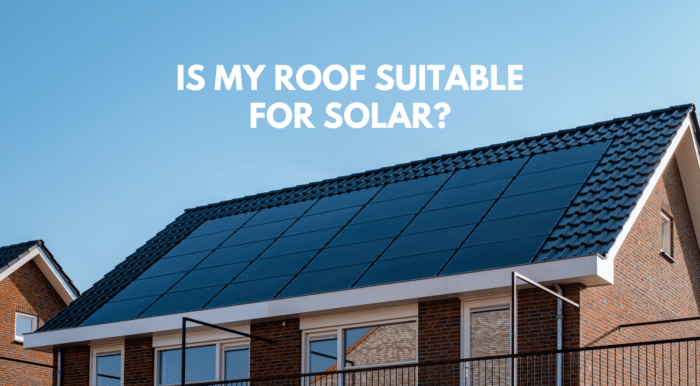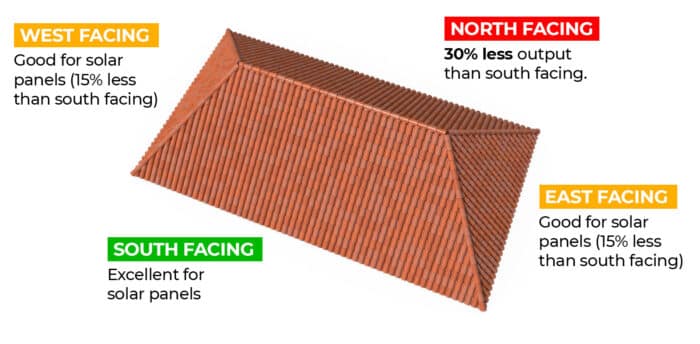Are you thinking about adding solar panels to your home? You may be wondering how suitable your roof is for solar panels and whether you can even have them at all?

Solar panels are suitable for most UK homes, but there are a few things to consider when checking your roof suitability for solar panels:
- Which way is my roof facing? (how much sunlight does your roof get during the day)
- The pitch of your roof.
- How large is my roof?
- Is my roof in good condition?
- What type of roof do I have?
- Are nearby buildings or trees shading my roof?
1. The Direction Your Roof Faces (Roof Orientation)
The direction your roof faces can affect the energy solar panels can produce. You can expect up to a 30% drop in the efficiency depending on your roof orientation.
The sun rises in the east and sets in the west. So if your roof is south facing then it will get the sun for the majority of the day making it the best orientation for placing solar panels. East and west facing roofs still offer good output – but a north facing roof is likely to offer a poorer level of energy generation from solar panels.
The diagram below shows the difference in expected energy production based on the orientation of your roof.

How to calculate the orientation of your roof
The simplest way to calculate the direction your home is facing is by using a compass. Luckily most smartphones have a free compass app already installed and ready to use.
If you don’t have a compass or a compass app on your phone you can also use Google Maps to find out the direction of your home. Simply enter your postcode to locate your home. Google maps IS automatically oriented to the north, so if your roof is facing towards the bottom of the screen then it is facing south.
2. The Pitch Of Your Roof
Often people don’t consider how the pitch of their roof might affect the potential energy produced from solar panels, and the good news is that most roofs are suitable but the pitch can affect how effective they can be.
Most roofs in the UK are between 30 – 50 degrees which is ideal for South, South East and South West Facing roofs. 30-50 degrees is still good for East and West facing roofs too.
If you have a low pitch (under 30 degrees) or flat roof then you should have good energy production from your roof.
It is only really the steepest of roofs that would offer low output from solar panels but our engineers will advise if you have a particularly steep roof on the potential loss on energy consumption.
3. Your Roof Space
The size of your roof will determine how many solar panels can fit on your roof and therefore affect the amount of energy your roof can produce. How many panels you need depends on your usage but an average household would require around 10 x 400W Solar Panels giving them a 4kW Solar PV System.
Just as a rough guide below is an estimate on the number of panels you can have based on the size of your home:
- 2 Bedroom Home – 8 x 400W Panels
- 3 Bedroom Home – 10 x 400W Panels
- 4 Bedroom Home – 12 x 400W Panels
- 5 Bedroom Home – 14 x 400W Panels
4. The Condition Of Your Roof
It is important that your roof is in good condition to be able to hold the weight of solar panels safely. During our assessment, our engineers will evaluate the condition of your roof to ensure it is structurally sound. If needed, your roof may require repair works before solar panels can be installed.
Having solar panels installed onto a new build property can impact any warranties on the roof of the property so this should be considered before having solar panels installed.
5. Roof Type
The material your roof is made of can impact the cost of installing solar panels on your roof. For example, installing onto a slate or Yorkshire Stone roof is more labour intensive and can require more materials to secure the solar panels all of which can impact the installation cost.
However, unlike many other companies, at Novus Energy we do not charge extra to install solar panels on slate or Yorkshire stone roofs. We can install on all types of roof except for the those listed below:
- Thatch Roofs: Not possible due to increased fire risk.
- Roofs containing Asbestos: Due to the safety hazard to workers.
- Glass Roofs: Too fragile to support solar panels.
6. Shadowy Roofs
Is your roof in shadow for part or all of the day? Perhaps by surrounding buildings, trees, chimneys, waste vents etc.
Even if shadowing occurs only where one panel would be on your roof, because all panels are linked it will reduce the efficiency of the whole system. However a well designed Solar Panel System can minimise the impact of any shadowing on your roof and our experts at Novus Energy will advise you on the potential impacts of any shadowing on your home.
Is your home suitable for solar panels?
Whilst all the areas above will help you to estimate the suitability of your home for solar panels, our solar engineers can assess your roof and give you accurate measures on the viability and the expected energy output from installing solar panels on your property.
Simply contact us today and we’ll come straight out to assess your home for solar panels.